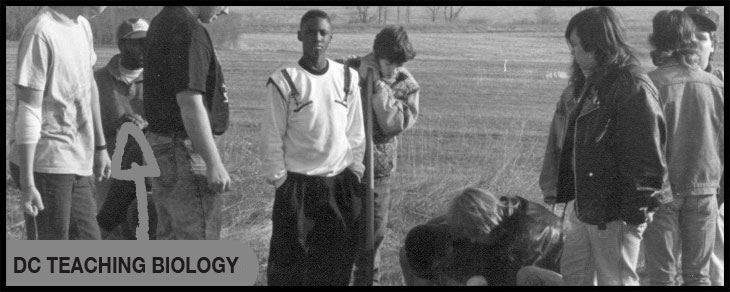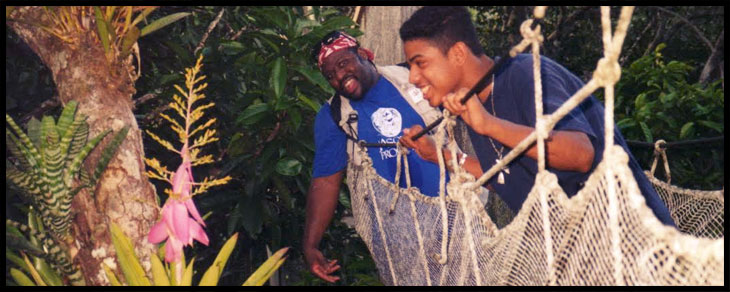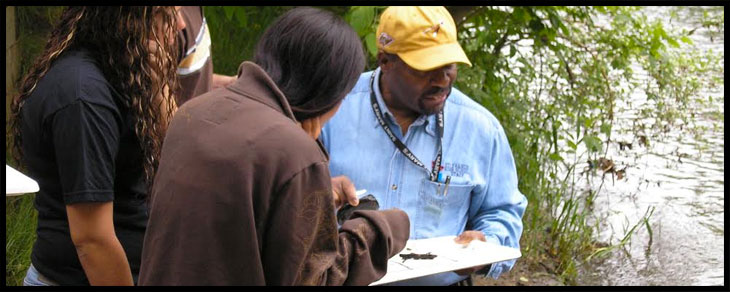I met DC a couple of years ago when he was leading a group of high school students to the Amazon rainforest. We were all introducing ourselves around the dinner table and I mentioned that I made science videos. At that moment, his entire class burst out. “We knew we recognized you from somewhere,” they said. Apparently DC had been using our videos in his high school classroom all year to help get the students excited about biology. Now, they were on the trip of a lifetime exploring the jungle themselves. I wanted to ask DC a few questions about his experience as a teacher and how he works to get them excited about science.
Fill us in on how you use the great outdoors to increase learning with your students?
As a scientist and an educator of science students learn the best when they can learn from first hand experiences of actually doing science instead of reading about it. So I would use the book for only introduction or background material and then create ways to have students get out into the environment and experience it as they learned the concepts and principles of biological sciences, be it ecology, environmental, wildlife management, or general principles of natural sciences.
What inspired you to start doing this?
The lack of actual real life experiences in my own educational experiences before I got to college. Teachers always taught us about it from the book but we never got the opportunity to really experience the wonders the natural setting had to offer. It wasn’t until I got to college that the professors got us out into the field to see what science what really like that I learned the most about science. I decided that we need to horn those experiences earlier in education for students so I decided once I was a teacher I was going to do this at the secondary level for students.

Why do you think it’s important – how does it benefit students?
I know it is important and it works because of the number of my students that have going on to post-secondary education and studied natural sciences as a result of taking my class. I also have personal reports from parents of gratitude for help their children find their mark in life as a result of take my science class. Also research will bail me out that students do better as a direct result of experiential learning vs just book learning or class activities that simulate real world experiences.
What is the hardest thing about this undertaking?
Well it is not getting the students to buy into this type of learning, it is convincing the administrators and school boards as well as the department of education both state and federal that this is how to best serve our students in education in science and in areas where experiences is a much more effective teacher than sitting in a chair and trying to grasp the skills from the book. Background knowledge is very important but without coupling it with practical real life experiences it doesn’t go very far.

What feedback have you had so far about the program?
Other teachers recognize the value in programs such as these for students, parents and students recognize the value in programs that work hard at finding ways to incorporate experiential learning into their programs, but as far as school administrators, school board, and department of education that is another story for another time. It is about restricting school days to accommodate such activity. Restructuring budgets and many different systems of education to be efficient to see to it that students get what they need and that doesn’t go over very well in this economy. We do praise the teacher that go out of his or her way to see that good things like this happen for students and then we consider them exceptional teachers. Well I am not an exceptional teacher I just see a need that needs doing to get my students where they need to be and I just do it. I do it because it is worth the effort. The State recognize me after 18 years and gave me a plaque for my services, but I would have much rather had more students and classes that I could have them through the program, but most of all a guarantee that the program will continue for students. I believe since I left the programs have left with me and that is a shame.
What are you doing now and how can other teachers take advantage of it?
I am continue to do what I feel and believe in, and that is I still work with students and schools with taking students to the Amazon Rain forest to give them first hand experiences in the natural world settings to learn about science first hand. I also work with educators helping school groups understand how field research is done at the University of Minnesota’s Cedar Creek field research Station. I give presentations to school groups, Rotary groups, citizen science groups on the rain forest and local ecology programs that they can get students involved with. Lastly, I am working with colleges to start their own tropical studies program at the facility that I run in Peru to give students that field experience in tropical studies. As I continue to work alongside of world class scientist to bring science to all people of the planet.

Do you have any advice for other teachers that may want to do similar things?
Please give students the opportunity to explore and learn about their planet first hand by going out there and experiencing what you are teaching them in the classroom. It is worth the effort that you put in by setting up the programs that give students experiential learning. Don’t be discouraged by administrators or nay-sayers that say it is too much work or can’t be done. I did it for 31years and it is the most rewarding teaching I have ever done.
Some Video From the Amazon
Here is a short little video showing some of the things DC does with his students in the Amazon.
Here is a short virtual tour of the rainforest canopy walkway that the students go see every year.
































































































